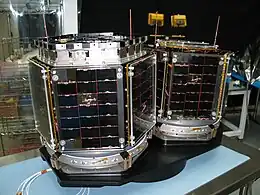Sparkie (satellite)
Sparkie[2] (or 3CS-1) was a satellite, part of the Three Corner Satellite (3CS) project, a three satellite (Sparkie, Ralphie and Petey) student research project. It was designed and built by mostly undergraduate students at the Arizona State University as part of the Air Force Research Laboratory's University Nanosat Program.[3]
 | |
| Mission type | Technology |
|---|---|
| Operator | ASU AFRL STP |
| Mission duration | Failed to orbit |
| Spacecraft properties | |
| Launch mass | 16 kilograms (35 lb) |
| Dimensions | 46 x 30cm (six-sided)[1] |
| Start of mission | |
| Launch date | December 21, 2004 |
| Rocket | Delta IV Heavy |
| Launch site | Cape Canaveral SLC-37B |
| Orbital parameters | |
| Reference system | Geocentric |
| Regime | Low Earth |
| Epoch | Planned |
Sparky was responsible for structure, power and the attitude system in the 3CS project.
Satellite carries the name of Arizona State University's mascot, Sparky.
Sparky was launched on the first launch of the Delta IV Heavy rocket configuration, along with the Ralphie satellite, but both satellites failed to achieve orbit due to a problem with the rocket during launch.[4]
See also
References
- "3CSat". Archived from the original on October 16, 2006. Retrieved 21 February 2011.
- Wade, Mark. "Delta IV Heavy". Encyclopedia Astronautica. Archived from the original on 20 November 2010. Retrieved 19 February 2011.
- Boeing (2004-12-01). "The DemoSat payload". Spaceflight Now. Retrieved 2011-02-18.
- Ray, Justin (2005-03-15). "Delta 4-Heavy investigation identifies rocket's problem". Retrieved 2011-02-18.
External links
This article is issued from Wikipedia. The text is licensed under Creative Commons - Attribution - Sharealike. Additional terms may apply for the media files.